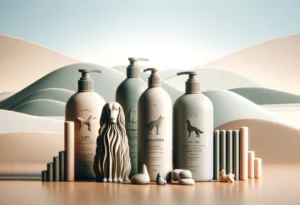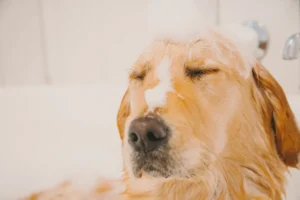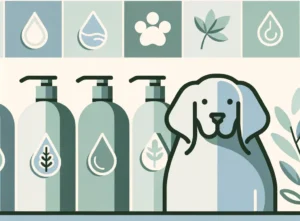Disclosure: We may earn a commission from helpful, relevant links in our content. No cost to you. See our privacy policy.
Think back to the last time you lathered up with your favorite shampoo. The scent, the feel, the freshness after a good rinse.
Now, consider the furry friend wagging their tail next to you. Don’t they deserve that same invigorating experience?
With the vast array of dog shampoos on the market, how can you be sure you’re picking the perfect one for your pup? After all, there’s a lot at stake: their skin health, coat shine, and of course, those blissful post-bath cuddles.
As you read on, you’ll find a guiding light to navigate the world of canine cleanliness. Let’s dive into the bubbles together and find that perfect lather for your four-legged family member.
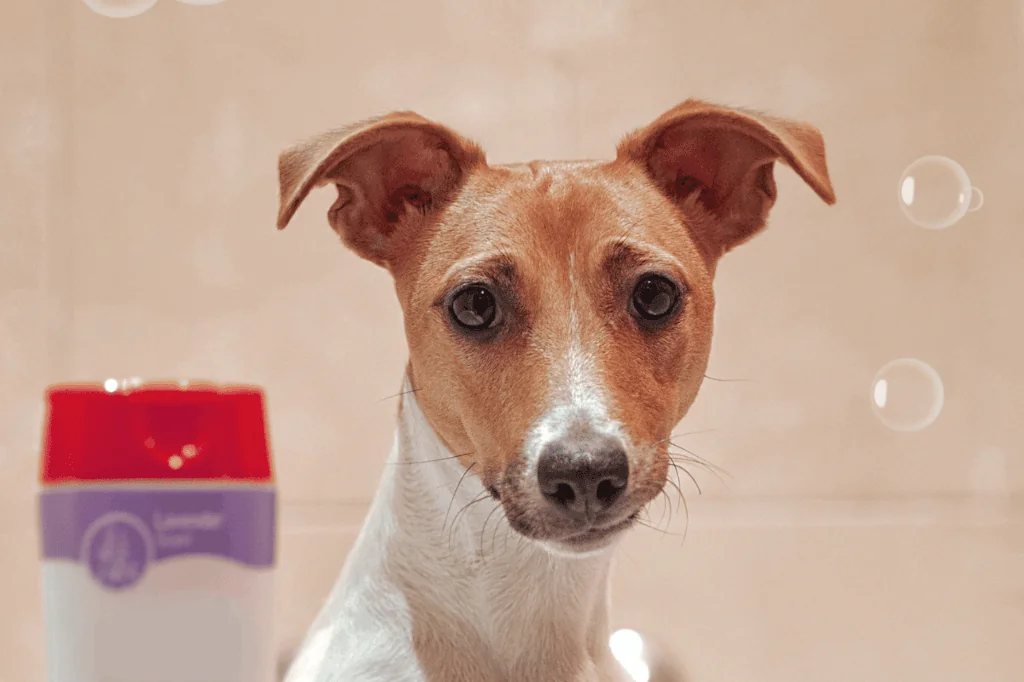
Types of Dog Shampoos
There are many different types of dog shampoos depending on your pup’s needs, their skin, health conditions, and their life stage. Here are the main types.
Basic Cleansing Shampoos
The most common type, these shampoos are formulated to clean the coat and skin. They’re great for regular bath routines and for dogs without any specific skin conditions. Look for products with natural ingredients like aloe vera or oatmeal to ensure gentle cleaning.
Medicated Shampoos
For pups dealing with skin issues such as rashes, irritations, or fungal infections, medicated shampoos come to the rescue. They often contain ingredients like hydrocortisone or antifungal agents.
Keep in mind that while these address specific issues, overuse might strip the coat of natural oils, so always follow the recommended usage. And consult with your vet before choosing a medicated shampoo.
Hypoallergenic Shampoos
A blessing for dogs with allergies or sensitive skin. These shampoos are free from harsh chemicals and fragrances which can trigger reactions. Instead, they boast of mild and natural ingredients that cleanse without causing discomfort.
Observe your dog after bathing. If there’s less scratching or skin irritation, you’ve likely found a winner.
Flea and Tick Shampoos
Pesky parasites have met their match. Infused with ingredients that repel or kill fleas and ticks, these shampoos not only cleanse but also protect. However, they should be used as part of a broader flea and tick control strategy.
Deshedding Shampoos
Wave goodbye to those tumbleweeds of fur rolling across your living room floor. Deshedding shampoos are specially formulated to help reduce excess shedding, strengthening the hair follicle and ensuring a healthier coat.
Puppy Shampoos
Our youngest canine companions have delicate skin. Puppy shampoos are milder, pH balanced, and designed specifically to be gentle for the newest members of our fur families.
Keep bath time short for puppies; their skin dries faster, and prolonged exposure to water can be drying.
Whitening and Color-Enhancing Shampoos
For those dogs sporting a light-colored or vibrant coat, these shampoos are designed to brighten and enhance their natural colors. They work by removing stains and yellowing, ensuring your dog’s coat looks its absolute best. Avoid frequent use, as these can sometimes be a bit harsher; alternating with a moisturizing shampoo can balance things out.
Here’s a comparison table of different dog shampoos:
| Type of Shampoo | Primary Benefit | Usage Frequency |
| Basic Cleansing | General Cleanliness | 1x every 4-6 weeks |
| Medicated | Treat Specific Skin Issues | As prescribed |
| Hypoallergenic | Gentle for Sensitive Skin | 1x every 3-4 weeks |
| Flea and Tick | Parasite Protection | As needed |
| Deshedding | Reduce Excess Shedding | 1x every 4-6 weeks |
| Puppy | Gentle for Young Dogs | 1x every 4 weeks |
| Whitening & Color-Enhancing | Enhance & Brighten Coat Color | 1x every 6-8 weeks |
Ensuring your dog’s bath time is both enjoyable and effective is crucial. By choosing the right shampoo, you’re prioritizing your pet’s comfort and health.
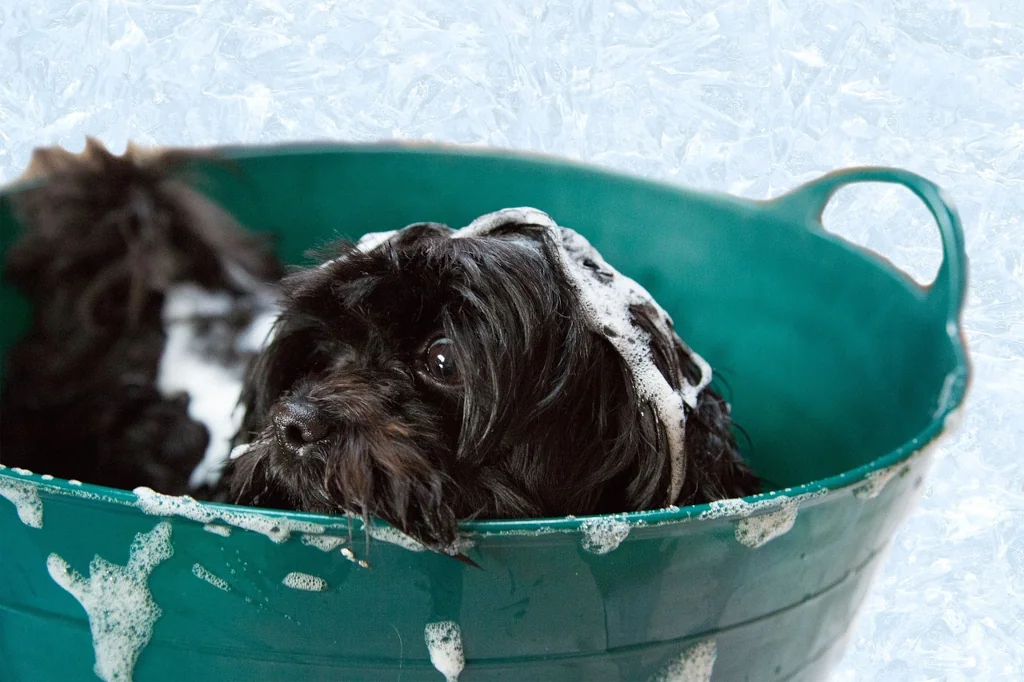
How Do You Choose the Right Shampoo for Your Dog?
Finding the perfect shampoo for your canine companion can be a game-changer for their health and happiness. Let’s dive into the essentials of selecting the best match for your furry friend.
1. Recognize Your Dog’s Skin Type
Every dog’s skin is as unique as its personality. Observing your dog’s skin is the first step. Is it dry, oily, flaky, or sensitive? A dog with dry skin might benefit from a moisturizing shampoo with ingredients like aloe vera or almond oil. Conversely, dogs with oily skin might require a formula that helps balance oil production.
2. Be Aware of Existing Conditions
If your dog has a diagnosed skin condition, ensure that the shampoo you choose doesn’t exacerbate the issue. For instance, a dog with a fungal infection would require an antifungal shampoo. If your pup is scratching more than usual, a hypoallergenic or medicated shampoo could be the way to go.
3. Coat Length and Texture Matter
A thick double coat, a short glossy one, or curly tendrils – your dog’s fur type can determine the kind of shampoo needed. Deshedding shampoos might be ideal for breeds known to shed a lot, while curly-haired breeds might benefit from a more moisturizing formula to prevent tangles.
4. Factor in Age and Lifestyle
Puppies have delicate skin that demands a gentler approach. Always choose shampoos designed specifically for pups. Additionally, if your dog is an adventurous sort, frolicking in the mud or swimming, they might require a shampoo with a deeper cleansing formula.
5. The Fragrance Factor
While a strawberry-scented pup might sound appealing, some dogs can be sensitive to fragrances. It’s always a good idea to go for mild, natural scents or fragrance-free options, especially if your dog has shown any previous signs of allergies.
6. Ingredients Check
Always peruse the ingredient list. Avoid shampoos with parabens, sulfates, and artificial dyes. Natural ingredients like chamomile, tea tree oil, and lavender can be beneficial for skin health and also provide a pleasant, mild aroma.
7. Consult with Professionals
Don’t hesitate to reach out to your vet or a professional dog groomer. They’ve seen and dealt with a myriad of canine skin and fur types and can provide insights tailored specifically to your furry friend.
8. Test and Observe
Lastly, don’t be afraid to test out a shampoo (always following the guidelines, of course) and observe its effects. If your dog seems itchier or if the coat looks dull, it might be time to switch. Remember, the best shampoo is the one that makes your dog feel comfortable, fresh, and happy.
By giving careful consideration to your dog’s individual needs and being armed with the right information, you can transform bath time into a delightful experience, ensuring your dog not only looks fabulous but feels fantastic from snout to tail.
What Ingredients To Avoid in Dog Shampoos?
Analyzing a dog shampoo’s ingredient list can be daunting, but we’re here to simplify it for you. Let’s unveil the essentials, spotlighting ingredients that may not be your pet’s best friends.
Artificial Colors and Dyes. Sure, a brightly colored shampoo might look appealing, but synthetic dyes can be harmful. They can cause allergies, itching, and even dryness. Opt for shampoos with natural colorants or none at all.
Parabens. Used as preservatives, parabens can mess with your dog’s hormonal balance. Instead, look for shampoos with natural preservatives like Vitamin E or rosemary extract.
Sulfates. These are the culprits behind the rich lather in many products. However, they can be harsh and strip your dog’s skin of its natural oils. Aim for sulfate-free formulas.
Mineral Oil. While it might sound harmless, mineral oil can create a barrier on the skin, preventing it from breathing. A better option? Natural oils like coconut or olive oil which nourish the skin.
Isopropyl Alcohol. Often found in cosmetics and personal care products, this can dry out your dog’s skin and even lead to inflammation or irritation.
Fragrance Oils. Here’s our unique twist – while many might tell you to simply opt for “fragrance-free”, we’d recommend you take it a step further. When a product states it contains “fragrance”, it can be a mix of numerous chemicals. However, essential oils used for scent, like lavender or chamomile, can be soothing and beneficial.
By investing a little time in understanding what’s inside that bottle, you’re gifting your canine companion with health, comfort, and confidence. After all, they deserve the best, don’t they?
How Do You Pick a Shampoo for a Double-Coated Dog?
Double-coated dogs come with their own set of grooming challenges. The shampoo you choose plays a crucial role in maintaining the beauty and health of such intricate coats. Here’s what to keep in mind:
- Deep Cleansing. These pups are prone to accumulate dirt and debris in their thick fur. A shampoo with deep cleansing properties ensures that the grime is adequately lifted without over-drying.
- Moisturizing. To prevent the undercoat from matting or tangling, a good dose of hydration is vital. Ingredients like shea butter, jojoba oil, or aloe vera can provide this much-needed moisture.
- Detangling. Even with regular brushing, double-coated breeds can develop tangles. A shampoo with detangling properties can be a lifesaver, making post-bath grooming a breeze.
- Minimal Shedding. Let’s admit, those fluffs of fur around the house can be a tad annoying. While double-coated breeds will naturally shed, certain shampoos can strengthen hair follicles, reducing excess shedding.
- Natural Ingredients. Once again, the emphasis on natural cannot be overstated. With such dense fur, any residual chemicals from shampoos can remain trapped, causing long-term irritation. Ingredients like oatmeal, lavender, or green tea can be both soothing and effective.
- Rinse Thoroughly. Not exactly a shampoo trait, but a tip worth gold. Ensure you rinse, and then rinse again. With double-coated breeds, shampoo residues can be a sneaky problem, leading to itchy spots later on.
Which Shampoos Do Dog Groomers Prefer and Why?
Stepping into the realm of professional dog grooming reveals a myriad of trade secrets. Having had countless conversations with veteran groomers, a few shampoos consistently top their list. But why?
1. Natural Ingredient Brands: Groomers frequently turn to shampoos infused with natural ingredients. Products like “Earthbath” or “4-Legger Organic” are often favorites, primarily due to their gentle and non-toxic properties.
2. Brands with Specific Solutions: Groomers also love shampoos tailored for particular issues. “Chris Christensen White on White” for enhancing white coats or “Vet’s Best Hypo-Allergenic Shampoo” for allergy-prone skin, for example.
3. Multi-purpose Shampoos: Time is of the essence in grooming salons. So, multipurpose solutions like “TropiClean Luxury 2 in 1” which cleans and conditions simultaneously are invaluable.
4. The Unsung Hero – Dilution Ratio: Here’s a unique tip straight from the insider’s mouth. Groomers often select shampoos based on their dilution ratio. A concentrated formula, which can be diluted more, offers both economic and environmental benefits, making brands like “ProPet Works” quite popular.
When choosing a shampoo, it’s not just about the brand or the smell. It’s about efficacy, safety, and value – something every professional groomer deeply understands.
Recommended Shampoos for Different Skin and Coat Types
Just like humans, each dog’s skin and coat are unique. Tailoring the shampoo to these unique needs ensures optimal health and a glossy finish. Drawing from my years of grooming and canine care, here are a few tried-and-tested recommendations:
- For Oily Coats: “Burt’s Bees for Dogs Natural Oatmeal Shampoo“. The oatmeal effectively balances out the natural oils, ensuring a non-greasy, healthy shine.
- For Dry, Itchy Skin: “Aveeno Soothing Bath Treatment with Natural Colloidal Oatmeal“. Its hydrating properties offer relief to parched, irritated skin. While formulated for humans, it contains 100% natural colloidal oatmeal, which is safe and often recommended for dogs.
- For Curly Coats: “Isle of Dogs Coature No. 1 Evening Primrose Oil Shampoo“. The formula helps retain the curl without letting it frizz.
- Sensitive Skin: “Vet’s Best Hypo-Allergenic Shampoo“. Made with a tearless formula, it’s delicate enough for the most sensitive pups.
- Expert’s Pick for Universal Use: This might surprise you, but “Dr. Bronner’s Baby Unscented Pure-Castile Liquid Soap” can be a fantastic pick for most dogs. Being unscented and made of organic oils, it’s gentle and can be diluted based on need. This is a tidbit I’ve picked up from years of observing different shampoos in action.
With the insights and recommendations you’ve just unlocked, consider yourself armed with the knowledge to navigate those aisles with ease and confidence. Remember, it’s not just about a clean coat but also about the love, care, and health you’re showering upon your furry friend. So, the next time you’re out shopping for your pup’s pampering products, reflect on this guide, trust your judgment, and listen to your heart. After all, no one knows your dog better than you do. Here’s to sparkling, happy, and wag-tastic baths! ???
FAQs
What kind of shampoo do most dog groomers use?
Most dog groomers gravitate towards shampoos with natural ingredients and high dilution ratios for their efficacy and cost-effectiveness. A good example of a natural ingredient dog shampoo is Earthbath.
How often should I shampoo my dog?
Ideally, dogs should be shampooed once every 4-6 weeks. However, those with specific skin conditions or outdoor lifestyles may require more frequent baths.
What makes a dog shampoo gentle?
A gentle dog shampoo typically contains natural, non-toxic ingredients, avoids harsh chemicals, and maintains the skin’s pH balance, often incorporating soothing agents like oatmeal or aloe vera.
Alex, a passionate animal lover, has experience in training and understanding animal behavior. As a proud pet parent to two dogs and three cats, he founded AnimalReport.net to share insights from animal experts and expand his knowledge of the animal kingdom.

